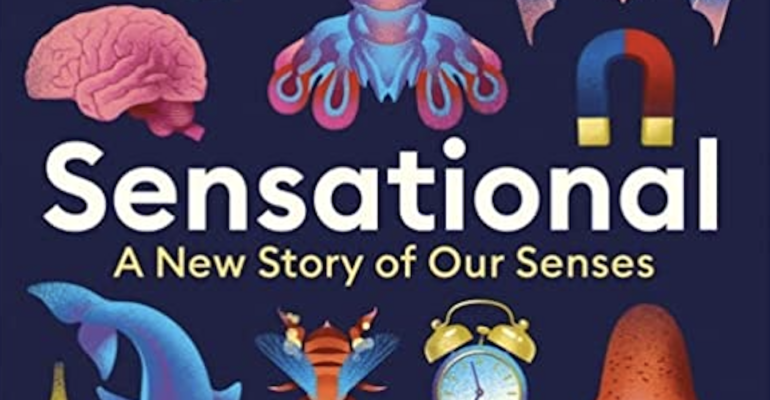A New Story of Our Senses and Transformative Tech: Why it matters
April 19, 2023 2023-04-19 19:06A New Story of Our Senses and Transformative Tech: Why it matters

A New Story of Our Senses and Transformative Tech: Why it matters
We often use the words “perceive” and “sense” interchangeably. But understanding how they differ is key to building transformative technologies that can improve our quality of life.
Our senses detect stimuli from the external world and contribute to our wellness and health. Tasting a delicious meal, listening to relaxing music, hugging someone we love… sensing allows us to connect, feel, empathize, support, care, rest, and live well.
Perception, on the other hand, happens in the brain and is influenced by our mindset. Our perception shapes how we view and interpret the world, and it is often biased by our expectations.
If I have a crush on someone, I will pay close attention to whether they laugh at my jokes, or if they keep their gaze on me while I speak, or if they give me a compliment. All of which are also signs of an innocent friendship.
We see what we want to see. 😉
Ashley Ward, in his book Sensational: A New Story of Our Senses, dives deep into the full potential of each sense – even some that we may not be aware yet – to unlock unlimited possibilities in the wellness realm. But how do we intentionally use our ability to sense for collaboration and community building? How can transformative technologies expand our senses to support our wellbeing?
Alice Ray, Troy Haines, Stephanie Dupont, Brit Estep, and I have studied Ward’s book and are excited to share what we think matters for Transformative Tech.
We use our senses to navigate the world and our perception to understand it.
The human eye has over 200 million receptors that process visible light, making it the most essential sense for our brain. But Ward alerts that the interpretation of sight is subjective and influenced by genetics, culture, and individual meaning. Since Artificial intelligence (AI) can mimic the intricate biological networks in our brain to generate visual content, what are the ethical processes in place to ensure AI algorithms will not be biased by their developers’ perception? What are the implications for human diversity?
Sound has the power to trigger emotions such as fear, anxiety, happiness, and relaxation. Different species and individuals react differently to various sound waves. Our perception of what we hear, Ward argues, is even more important than our instinctive reaction to sound. Speed, cadence, volume, and wave frequency of sound are imbued with cultural meaning.
Can we intentionally use sound, vision, and the other senses for positive outcomes?
Big Ramifications for Transformative Tech
We can expand our senses beyond their natural limitations with transformative technologies.
And because we can intentionally cross senses to create new neural pathways, we can enhance our ability to interpret the world. For example, using light and sound together can help create a more immersive experience.
Ward’s Sensational: A New Story of our Senses allows us to dream of enhancing our biology to achieve higher, happier levels of the human psychological state. Technology can – and is already – creating its own system of sight, sound, touch, and smell.
Transformative technologies, however, can go beyond. They can notice how a particular intonation changes the context of a speech. They can identify harmful features in a picture and improve on it. They can add texture to an otherwise boring object. They can generate smells that will positively impact our nervous system. They can essentially act as our perception, enhancing the meaning and interpretation of our sensory experience.
But they can also enhance our biases.
Big Ethical Considerations for Transformative Tech
By now, it is quite obvious that designing and building transformative technology to enhance our senses and augment our perception is subject to ethical conflicts.
The implications of Ward’s vision as to how we can experience the world differently through our senses are enormous. And so is the potential of designing technologies to aid in this process with perception biases embedded in them.
If we are to recreate our perception, we might end up recreating our biases too. Transformative technologies must be built on diverse perspectives and with cultural and personal nuances to fully succeed in our mission towards longer, healthier, and happier lives.
Below you will find a summary of each team member’s take-away for our Transformative Tech community within the chapters of Sensational: A New Story of Our Senses.
Needless to say, I am excited about your reflections on how this new understanding of our senses changes the way you perceive, utilize, or design transformative technologies.
Love,
Nichol, and Alice Ray, Troy Haines, Stephanie DuPont, Brit Estep
P.S. The next book club is Ivy and Susan’s Your Brain on Art to discuss with me on Friday, May 5th 12-1:30 PM PST. Hit Reply and let us know if you want to join that discussion.


Comment (1)
Bryan McMahon
How does one get in contact with this group? I would like to speak to Mrs Nicole Bradford about a neurogenesis machine I have developed. Is there a way to contact transformative tech?
213-884-3941
UAB 912@gmail